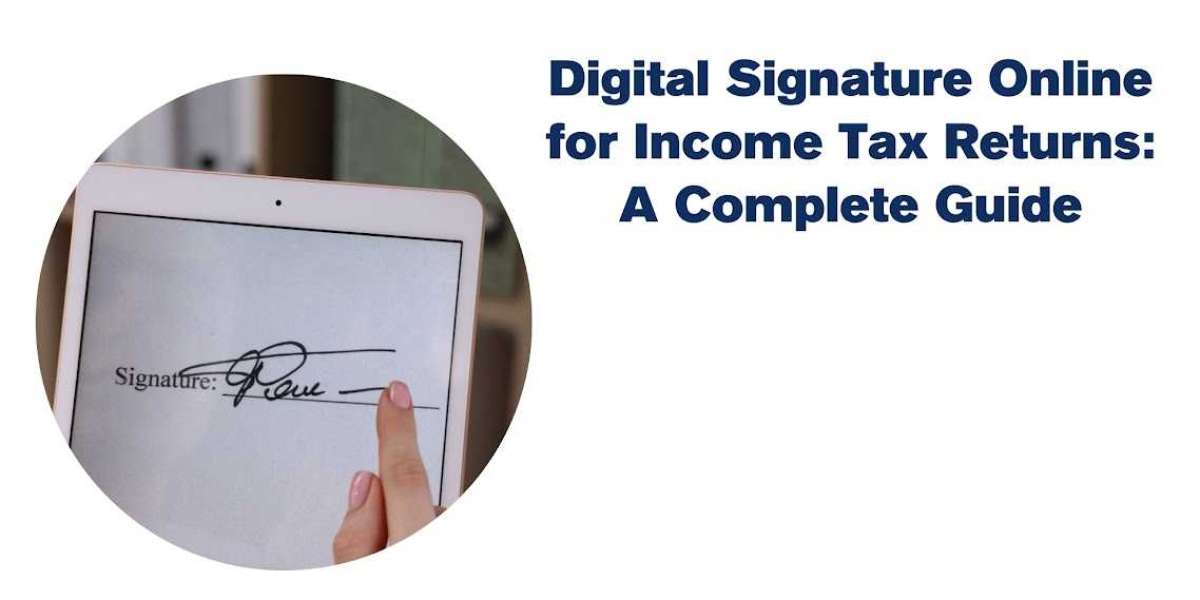In the era of digital transformation, income tax filing has also embraced technology to streamline processes, improve security, and enhance transparency. One of the most critical components of this transformation is the Digital Signature Online, which allows taxpayers to authenticate and submit their Income Tax Returns (ITRs) electronically. Whether you're a salaried professional, business owner, or Chartered Accountant, understanding how to use a digital signature online for income tax returns is essential.
This article delves deep into the role, benefits, types, application process, legal framework, and best practices related to Digital Signatures for ITR filing in India.
1. What Is a Digital Signature?
A Digital Signature is the digital equivalent of a handwritten signature or stamped seal. It is issued by Certifying Authorities (CAs) and is used to authenticate the identity of the sender of a digital message or the signer of a document.
Key Features of a DSC:
- Legally Valid under the Information Technology Act, 2000
- Ensures data integrity and non-repudiation
- Offers authentication, authorization, and confidentiality
- Required for filing income tax returns, GST, MCA forms, and tenders
2. Why Use Digital Signature for Income Tax Returns?
Filing income tax returns using a digital signature online offers several advantages:
A. Mandatory for Certain Taxpayers
- It is mandatory for:
- Companies
- Limited Liability Partnerships (LLPs)
- Individuals and firms whose accounts are required to be audited under Section 44AB of the Income Tax Act
- Optional but highly recommended for other taxpayers
B. Enhanced Security
DSC ensures secure encryption and authentication, reducing the risk of identity theft and fraudulent filings.
C. Faster Processing
Returns filed with DSC are processed more quickly than those verified via physical ITR-V submission.
D. Paperless Verification
E-verification using DSC eliminates the need to send signed physical copies to the Central Processing Centre (CPC) in Bengaluru.
3. Who Needs a Digital Signature for ITR Filing?
Mandatory Users:
- Companies and LLPs
- Individuals/firms subject to audit under the Income Tax Act
- Authorized representatives or CA filing on behalf of clients
Recommended Users:
- High net-worth individuals (HNIs)
- Professionals with multiple income sources
- Individuals wanting faster and more secure e-verification
5. Step-by-Step Guide to Apply for Digital Signature Online
Here is a simplified guide to getting a DSC for income tax return filing:
Step 1: Visit Our Website
Go to our website to start the process.
Step 2: Fill in Your Details
- User Type: Choose if you are an individual or an organization.
- Certificate Type: Pick if you need it just for signing documents or for both signing and encryption.
- Validity: Choose how long you want the certificate to last.
- Personal Info: Enter your name, phone number, email, and address.
- Agree to Terms: Check the box to agree to the terms.
- Submit: Click the submit button.
Step 3: Choose Token Option
- Already Have a Token?: If you have a USB token, choose "No." If you need a new one, choose "Yes."
Step 4: Make Payment
- Payment: Enter your payment details and choose how you want to pay (net banking, credit card, debit card, or UPI).
Step 5: Complete the Process
- Review: Make sure all your information is correct.
- Submit: Click submit and wait for a confirmation email.
Step 6: Get Your Digital Signature
You’ll receive your digital signature on a USB token drive after processing.
6. Legal Validity of Digital Signatures in India
Information Technology Act, 2000
- Digital signatures have legal recognition
- Section 3 of the Act provides for authentication using an asymmetric cryptosystem
- Section 5 grants equivalence to handwritten signatures
Income Tax Act Rules
- Rule 12(3) mandates DSC usage for specified persons
- CBDT notifications clarify acceptable DSC formats and compliance procedures
7. Security Tips for Using Digital Signatures
- Use a certified USB token
- Never share your DSC PIN or token
- Install anti-virus software
- Avoid using public/shared computers
- Always log out after usage.
8. Role of DSC for Chartered Accountants Tax Consultants
Chartered Accountants and Tax Consultants often file ITRs on behalf of clients. For them:
- DSC is essential
- It allows them to act as authorized signatories
- Reduces turnaround time
- Boosts client trust and compliance
9. Future of Digital Signatures in Taxation
With the increasing focus on Digital India and faceless assessments, DSCs will become even more central to:
- AI-driven tax systems
- Blockchain-based records
- Paperless audits
DSCs ensure that the identity and intent of taxpayers are digitally traceable.
Also read:- What is emudhra?
Conclusion
Using a Digital Signature Certificate online for income tax returns isn’t just a technical step—it’s a leap toward secure, compliant, and efficient tax filing. Whether you’re an individual taxpayer or a corporate entity, embracing DSCs is crucial for seamless ITR filing and regulatory compliance.
As the Income Tax Department continues to digitize its systems, DSCs are set to become a non-negotiable part of India’s taxation landscape. Invest in a valid Class 3 DSC today, and take control of your digital financial identity.








